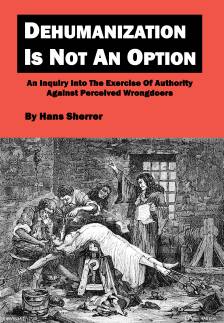

Justice Denied, PO Box 66291, Seattle, WA 98166
The Justice Institute © 1998-2021
(Justice Denied is a trade name of The Justice Institute)
 DONATE
Search
DONATE
Search

DEHUMANIZATION IS NOT AN OPTION

Review by Professor Michael Fox
Michael Fox is Associate Professor Hyogo College, Kakogawa City, Japan, and director Japan Institute for the Study of Wrongful Arrests and Convictions
The 1970's saw several remarkable psychological experiments which continue to impact the study of incarcerations, particularly the human ability to inflict pain and degradation without respite. The most famous experiment, carried out by Phillip Zimbardo at Stanford University, created a prison environment in a basement laboratory. The experiment, designed to last two weeks, was terminated on the sixth day due to mental violence and psychological abuse inflicted by the student guards upon the student inmates. Similarly, Experiments conducted by Researcher Stanley Milgram and high school educator Ron Jones shed light on the human capacity to surrender judgement and obey authority to the extant of wilfully torturing an unknown person.
Using these cases as a starting point, author Hans Sherrer diagnoses the social and psychological forces which influence incarceration and the treatment of criminals, both real and perceived.
After introducing the experiments, the analysis also touches on the holocausts of World War II. The first holocaust was that of the Nazis against Jews, Gypsies, gays and other despised minorities. Sherrer discusses the character of Eichmann, the quiet family man who wilfully oversaw the massive annihilation. A second vengeful holocaust was carried out by by Allied forces, (predominantly American) after World War II. Hardly part of commonly taught history, the author cites James Bacque who states that "over five million Germans were incarcerated after the war, many of whom died of disease and exposure."
In Summary, Sherrer deftly elucidates how bureaucracies instill obedience and reward apathy even while carrying out grossly evil acts. Perhaps the book should have been entitled "Authority, Obedience, and the Will to Harm." Concise and well written, I highly recommend this work as an excellent supplemental text for Introductory Psychology and Criminology Courses, and as a must read for the student of Penology. Those familiar with the Zimbardo experiment and other content will be given a refreshing review by the editor of Justice: Denied: the magazine for the wrongly convicted.
Click on what book part
you want to see
| Justice Institute |
| About Justice Denied |
| Donate |
| Search |
| Contact |
| Bookshop |
| From The Big House |
| High Fence Foodie |
| Phantom Spies, Phantom Justice |
| Edwin M. Borchard – Convicting The Innocent |
| Dehumanization Is Not An Option |
| Kirstin Blaise Lobato |
| Kirstin Lobato v. Nevada |
| JD Archive |
| JD Article Index |
| Innocence Project Webpages |
| Innocent people on web |
| Wrongful Conviction Websites |
| Exoneration Database |
| Wrongful Conviction Bibliography |
| JD Articles Online |